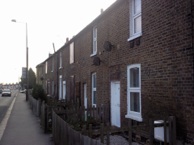MHC started in 1980. It worked alongside Middlesex Housing Association (MHA), which was founded in 1969, and Hounslow Self Help Housing Association. The first activists in these movements were young members of the Campaign for Nuclear Disarmament and the Labour Party. They campaigned for the building of more affordable rented houses. Their own problems led them to seek solutions. They moved beyond protesting to the promotion of tenant-controlled housing.
Initially they housed themselves by organising privately-rented flat sharing. The next step was conducting empty property surveys. They identified local council derelict properties, negotiated nominal cost “short-life” leases and did renovation work. Members saved regularly in loan stock to pay for materials. The renovated houses and flats provided “temporary” housing for those who were not on council priority lists for between two to thirty years.
Permanent West London housing co-operatives were started by MHA from 1974 to 1986 using Government “public funding” which was then available for Co-ops. MHA staff provided these co-ops with administration, housing management and maintenance services. Development services initially came from the Society for Co-operative Dwellings (SCD) and later from several Housing Associations. In 1986 SCD was closed down and the MHA business and staff were transferred to start up Co-op Homes in the hope of more public funding. Sadly, the Government funding rules changed in 1988 to require private finance for housing development. This favoured larger Housing Associations and stopped the formation of new Housing Co-ops.
Co-op Homes staff have continued to service MHC and twenty other co-ops in London and the Thames Valley.
WHO DOES MHC HOUSE
MHC does not house vulnerable people or families with young children who both get priority for subsidised social housing from councils and Housing Associations. People who can’t afford to buy or rent private housing or who are not a high priority for social housing can apply to MHC. They must be willing to work with other applicants as volunteers, helping with renovation work and with running the organisation. Most applicants are younger people and childless couples. A very small number are families without young children. The voluntary work of MHC members keeps costs down so that rents are below 80% of market levels despite not having any subsidy. Skills learnt as MHC members are the key to transfer into other co-ops which have subsidised lower rent levels.
WHAT PROPERTIES DOES MHC HAVE
Properties are mainly temporary houses or flats leased from other owners. Some are owned by MHC but are used as temporary housing. They are generally let to two or three younger single people sharing. A few self-contained flats and houses are let to older singles, childless couples and families without young children. Temporary properties can remain in use for many years and residents with good behaviour and rent payment records get priority for permanent re-housing. Most of the properties are in the London Borough of Ealing, Hillingdon and Hounslow. MHC also owns a block of flats in Stowmarket, Suffolk which are in temporary use awaiting re-development as a permanent scheme. There are long term plans to develop more permanent schemes based around properties already owned by MHC.
HOW CAN I APPLY AND BECOME INVOLVED IN MHC
You must register with your local council and find out what is your priority level for housing. MHC will require you to remain registered so that you don’t miss permanent housing opportunities by moving into MHC temporary property. You must volunteer to join MHC renovation working parties so that you get to know the people with whom you might be sharing or who are living nearby in other MHC properties. You must attend MHC meetings and learn how to become skilled as a committee member of a Co-op. This will improve your chances of permanent re-housing in a Co-operative.


